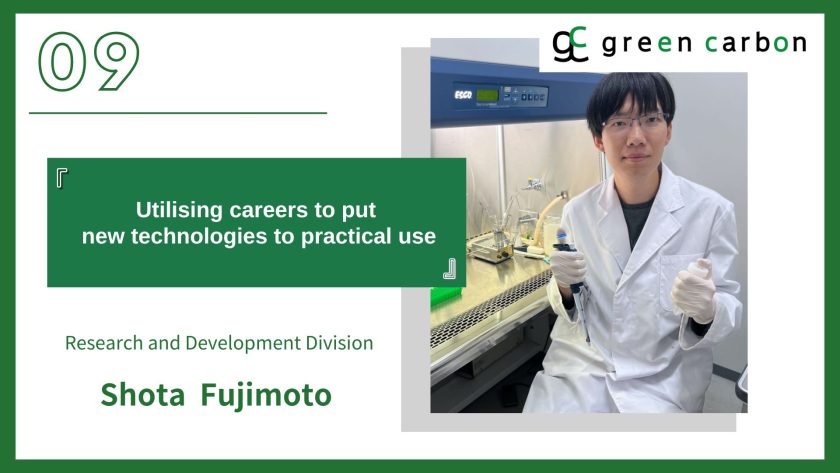We conducted an interview with Shota Fujimoto from the Research and Development Division. Please read to the end!
Q.Please briefly introduce yourself, including your career to date.
During university, I researched plant gene function analysis by conducting genome editing based on genetic analysis results. After graduating, I joined a major chemical company where I worked on collaborative research projects with universities and was responsible for microbial screening and breeding projects with domestic biotech ventures.
Currently at Green Carbon, I’m collaborating with various universities to advance joint research aimed at commercializing new technologies for greenhouse gas emission reduction.
Q.What type of work are you involved in? Please tell us about your work.
I’m primarily involved in joint research with universities, conducting R&D on carbon-neutral technologies. Currently, I’m cultivating rice in paddy field-simulated environments and conducting precise measurements of greenhouse gas (GHG) emissions to verify measures that can further reduce GHG emissions. I’m also applying for grants in collaboration with universities to advance our research even further.
Additionally, when new technologies come up internally, I handle information gathering on related intellectual property and research papers to evaluate the effectiveness of these technologies.
Through these activities, I hope to quickly bring innovative technologies to market and contribute to a sustainable future.
Q.What made you decide to work for Green Carbon?
Hearing about the introduction of carbon taxes in Europe, an environmentally advanced country, and the increasing number of consumers who want to buy products with low GHG emissions, I was vaguely concerned about the future of the Japanese export industry, partly because of the inevitably long transport distances.
Therefore, at least until the companies innovate carbon neutral technologies, we thought that if we could provide a place where we could compete with local companies in terms of product value with the same environmental impact by using carbon credits, we could maintain our international competitiveness.
It was in this context that I joined the company when I learnt that there was a company actively creating and trading carbon credits under the vision of ‘saving the planet with the power of life’ and wondered if I could make use of my career to make this happen.
Q.What challenges have you faced so far?
It would be rarer not to have challenges, but one thing I would raise is that I often work in areas that I don’t know much about. For example, in our current rice cultivation trials, we lack knowledge of soil micro-organisms, so we are learning from specialist teachers and deepening our knowledge through literature research.
In addition, even if there is an attractive technology, it is sometimes difficult to put the technology to practical use, as the company may face challenges of cost and human resource efficiency as a business operation. In the future, I would like to identify the important points among these challenges and solve them effectively.
Q.What is the most rewarding aspect of your job?
The very difficult part is to successfully incorporate actual field conditions and environments into the research. It is impossible to reproduce them perfectly, so we have to make selections and simplifications, but it is very rewarding when we start to get around to it.
Also, sometimes unexpected technical problems arise at the preliminary experimental stage, and we struggle to ensure that they do not occur in the main experiment.
Q.Finally, do you have a message for those who want to work for Green Carbon?
Carbon credits are currently in their startup phase and I believe they’ll continue to expand significantly. That’s precisely why now is the most exciting time to be involved. We’re still in the budding stage, but let’s grow together until we bear fruit. I look forward to working together with everyone on carbon credit creation.

